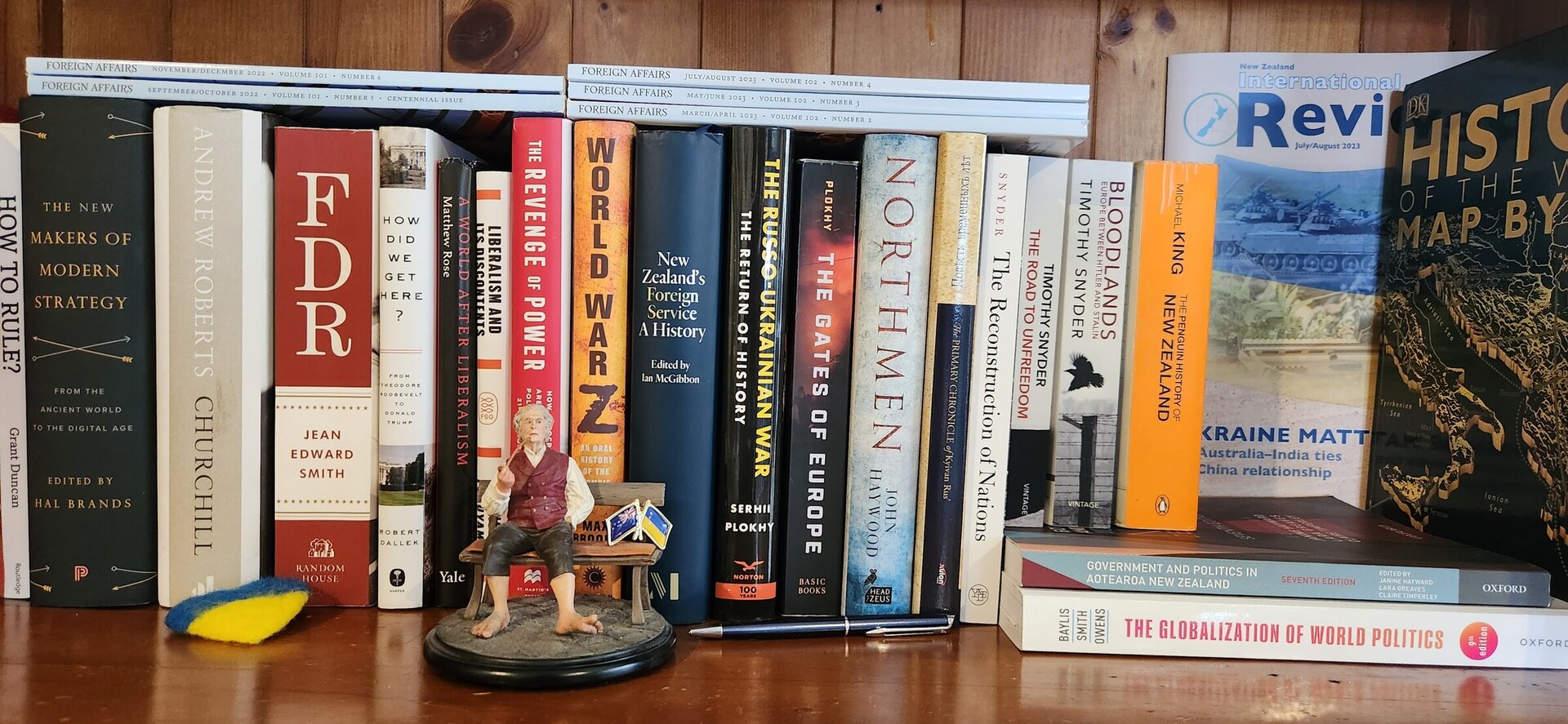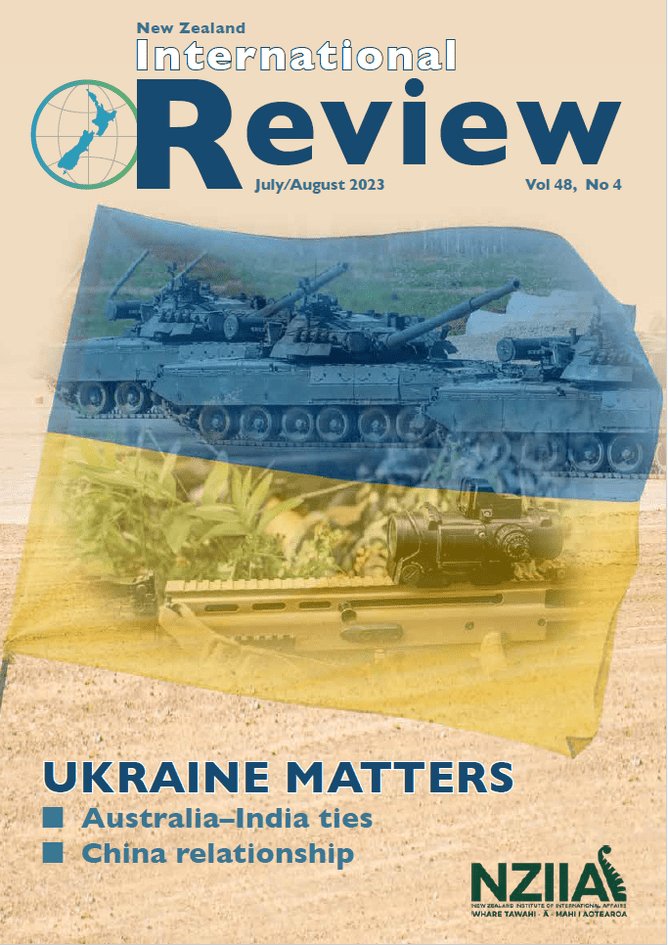The full article titled "The problem of war" was published in the January/February 2024 (Vol.49#1) issue of the New Zealand International Review
While scholars debated whether wars were declining or just transforming, in February 2022 the world sleepwalked into the biggest inter-state war in Europe since 1945. Despite the state aggressor (russia) being evident, some politicians, analysts and scholars managed to contrive alternative — sometimes truly Orwellian — versions of the motives of the invasion...
[...]
...since Russia’s full-scale attack on Ukraine in February 2022, it has become clear that for some leaders like Vladimir Putin inter-state aggression remains a tool to revise the world order and rebuild an empire.
[...]
...Which theory every one of us chooses to pursue in life will collectively shape the world we and our children will live in.
References
Ashford, E. (2022). In praise of lesser evils: Can realism repair foreign policy? Foreign Affairs, 101(5), 211-218. https://www.foreignaffairs.com/reviews/praise-lesser-evils-realism-foreign-policy-emma-ashford
Barkawi, T. (2023). War and world politics. In J. Baylis, S. Smith, & P. Owens (Eds.), The globalization of world politics: An introduction to international relations (Rev. ed., pp.213-227). Oxford University Press.
Baylis, J. (2023). International and global security. In J. Baylis, S. Smith, & P. Owens (Eds.),The globalization of world politics: An introduction to international relations (Rev. ed., pp.228-243). Oxford University Press.
Berdal, M. (2011). The ‘New Wars’ thesis revisited. In H. Strachan & S. Scheipers (Eds.), The changing character of war. (pp.109-133). Oxford University Press.
Boot, M. (2023, March 10). What the neocons got wrong: And how the Iraq war taught me about the limits of American power. Foreign Affairs. https://www.foreignaffairs.com/iraq/what-neocons-got-wrong
Churchill, W. (1934, November 15). Notes of broadcast speech by Mr. Winston Churchill, M.P. (LG/G/4/5/7). UK Parliament.
Cox, M. (2023). From the end of the cold war to a new world dis-order? In J. Baylis, S. Smith, & P. Owens (Eds.), The globalization of world politics: An introduction to international relations (Rev. ed., pp.70-84). Oxford University Press.
Dunne, T. (2023). Liberal internationalism. In J. Baylis, S. Smith, & P. Owens (Eds.), The globalization of world politics: An introduction to international relations (Rev. ed., pp.103-115). Oxford University Press.
Evans, T. (2023). Poverty, hunger, and development. In J. Baylis, S. Smith, & P. Owens (Eds.), The globalization of world politics: An introduction to international relations (Rev. ed., pp.425-440). Oxford University Press.
Foley E. & Kaunert C. (2022). Russian private military and Ukraine: Hybrid surrogate warfare and Russian state policy by other means. Central European Journal of International and Security Studies, 16(3), 172-192. DOI: 10.51870/ULJU5827.
Fukuyama, F. (2022). Liberalism and its discontents. Farrar, Straus and Giroux.
Hobden, S. (2023). Marxist theories of international relations. In J. Baylis, S. Smith, & P. Owens (Eds.), The globalization of world politics: An introduction to international relations (Rev. ed., pp.116-131). Oxford University Press.
Hurrell, A. (2023). Rising powers and the emerging global order. In J. Baylis, S. Smith, & P. Owens (Eds.), The globalization of world politics: An introduction to international relations (Rev. ed., pp.85-99). Oxford University Press.
Jones D. M. (2005). Peace through conversation. The National Interest 79(1), 93–100.
Jones D. M., & Smith, M. L. R. (2015). Return to reason: Reviving political realism in western foreign policy. International Affairs, 91(5), 933–952.
Kagan, R. (2023). A free world, if you can keep it: Ukraine and American interests. Foreign Affairs,102(1), 39-53. https://www.foreignaffairs.com/united-states/robert-kagan-free-world-if-you-can-keep-it-ukraine-america
Lind, J. (2022, December 23). Japan steps up: How Asia’s rising threats convinced Tokyo to abandon its defense taboos. Foreign Affairs. https://www.foreignaffairs.com/japan/japan-steps
McFaul, M., Sestanovich, S., & Mearsheimer, J. J. (2014). Faulty powers: Who started the Ukraine crisis? Foreign Affairs, 93(6), 167-178. https://www.foreignaffairs.com/articles/eastern-europe-caucasus/2014-10-17/faulty-powers
Mampilly, Z. (2022). The Du Bois doctrine: Race and the American century. Foreign Affairs, 101(5), 156-167. https://www.foreignaffairs.com/united-states/web-du-bois-doctrine-race-america-century
McGrew, A. (2023). Globalization and global politics. In J. Baylis, S. Smith, & P. Owens (Eds.), The globalization of world politics: An introduction to international relations (Rev. ed., pp.19-35). Oxford University Press.
Mearsheimer, J. J. (2014). Why the Ukraine crisis is the West's fault: The liberal delusions that provoked Putin. Foreign Affairs, 93(5), 77-89. https://www.foreignaffairs.com/articles/russia-fsu/2014-08-18/why-ukraine-crisis-west-s-fault
Rosenboim, O. (2023). Realism. In J. Baylis, S. Smith, & P. Owens (Eds.), The globalization of world politics: An introduction to international relations (Rev. ed., pp.132-146). Oxford University Press.
Scholtz, O. (2023). The global Zeitenwende: How to avoid a new Cold War in a multipolar era. Foreign Affairs, 102(1), 22-38. https://www.foreignaffairs.com/germany/olaf-scholz-global-zeitenwende-how-avoid-new-cold-war
Wight, C. (2019). Violence in international relations: The first and the last word. International Relations, 33(2), 172-194.


